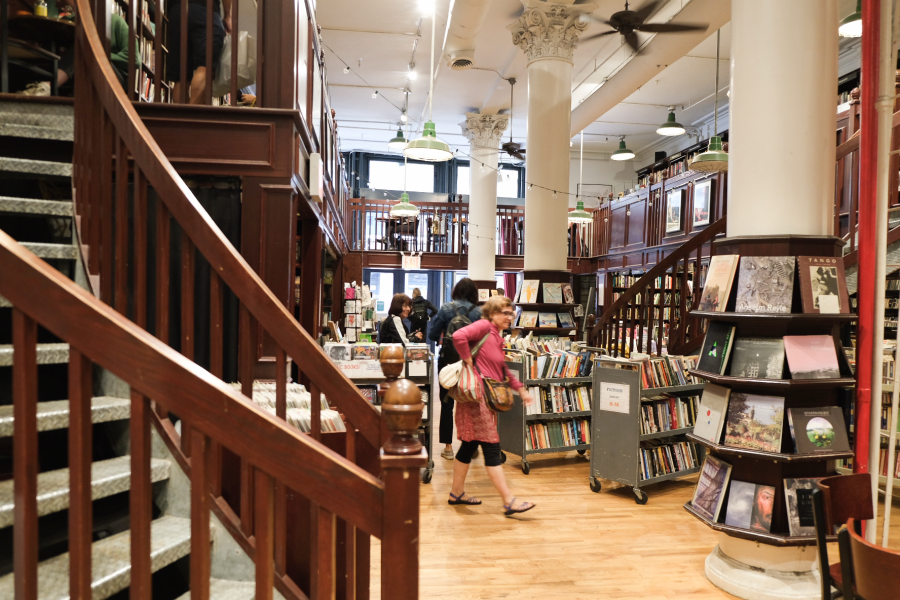In his novel “American Gods,” Neil Gaiman writes, “What I say is, a town isn’t a town without a bookstore. It may call itself a town, but unless it’s got a bookstore, it knows it’s not foolin’ a soul.”
The Guardian reports a decline in bookstores in Manhattan from 386 in 1950, to 106 in 2015, to a mere 80 or less in 2019. Communities throughout Manhattan and the outer boroughs, however, have rallied together time and time again to keep New York a literary city.
Westsider Books announced their closing this past January, but managed to stay in business through crowdfunding, as locals rushed to save the small business. Other rescued businesses include Midtown’s beloved Drama Book Shop, purchased by Lin-Manuel Miranda.
In May, the West Village said goodbye to Bookbook, with owners Carolyn Epstein and Chuck Mullin explaining in WestView News that “commercial changes in the neighborhood, alas, have forced us to finally end this phase of our lives as booksellers.” Despite the disappearance of the brick-and-mortar shop, however, Epstein and Mullin plan to continue their business as a pop-up at the Abingdon Square Greenmarket, and, occasionally, by the pickle stand on Carmine Street, between Sixth Avenue and Bleecker Street.
Rent hikes continue to threaten small, independent shops like Bookbook, but the city’s bibliophiles won’t give up without a fight. In October 2018, SoHo staple McNally Jackson Books seemed to face an inevitable relocation when the rent on the Prince Street store was bumped up from $350,000 to a staggering $850,000, according to Vulture. Owner Sarah McNally was, however, able to negotiate a mangeable deal with the landlord ($650,000 for now with gradual increases over the next five years), and within weeks was in the process of opening not one but two new locations in Downtown Brooklyn and South Street Seaport.
“McNally said that prospective landlords had approached her — and not the other way around — for both the Seaport and City Point projects,” Vulture reported.
Despite the threat of Amazon and unprecedented rent hikes, indie bookstores continue to crop up in New York City, such as Books Are Magic in Cobble Hill, which opened its doors in May 2017. Owner Emma Straub told “Elle,” “When my husband and I found out that our local bookstore was closing, there were only two clear choices: Open a bookstore, or move.”
In 2015, six-year-old Greenlight Bookstore, located in Fort Greene, opened a second location in Prospect Lefferts Gardens. Cafe con Libros opened shop in Crown Heights in January 2018, describing itself as a “feminist community bookstore […] born from and are guided by the lush cannon of Black Feminist thought producers and activists.” The space seeks “to advance and uplift stories of womxn and girls around the globe who are redefining the word feminist and feminism with every day, ordinary culturally informed acts of resistance and love.” The feminist bookstore even prices their books at less than full retail value.
On the Lower East Side, Bluestockings Bookstore, Cafe & Activist Center hosts readings, workshops, performances, discussions and films almost every night. The store is volunteer-powered and collectively-owned.
This past May, Noëlle Santos opened The Lit. Bar in the Bronx in response to a 2014 petition to save a local Barnes and Noble, the last bookstore in the borough.
“This neighborhood is gentrifying, and we’re going to start seeing more and more businesses that look more upscale coming into this neighborhood,” Santos said. “I don’t want anybody from the existing population to walk by this place and question for a second that this place isn’t for us.”
The indie bookstore of 2019 is not just a place to buy books, but a place to find community, have a coffee, do some writing, attend literary events — or even take crochet and knitting classes at the BookMark Shoppe in Bay Ridge.
We’ve all heard that millennials are investing in experiences, not things. The city’s independent bookstores are keenly aware of this, and are staying afloat by doing what Amazon cannot: bring people together, carefully curate their selection and provide an experience beyond the page.
These stores also have a moral conscience that is appealing to New Yorkers. Housing Works Bookstore Cafe and Bar, for example, gives 100% of its profits to their foundation, dedicated to “ending the twin crises of AIDS and homelessness.”
The Brooklyn Book Festival will take place this Sept. 16 – 23 and will showcase some of the city’s most beloved booksellers at its Literary Marketplace on the 21st and 22nd. It is these kinds of celebrations of the city’s booksellers that continue to foster a love for, and loyalty to, the brick-and-mortar stores that — as Gaiman said — make a town a town.
A version of this article appears in the Tuesday, Sept. 3rd, 2019, print edition
Email Julie Goldberg at [email protected].























































































































































